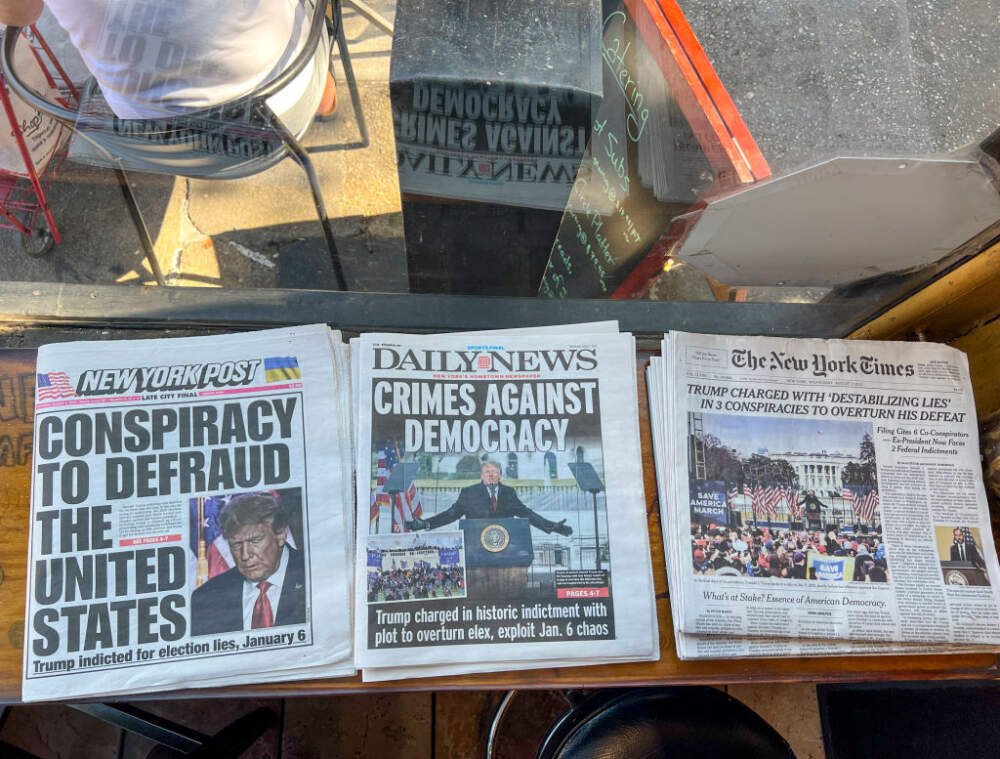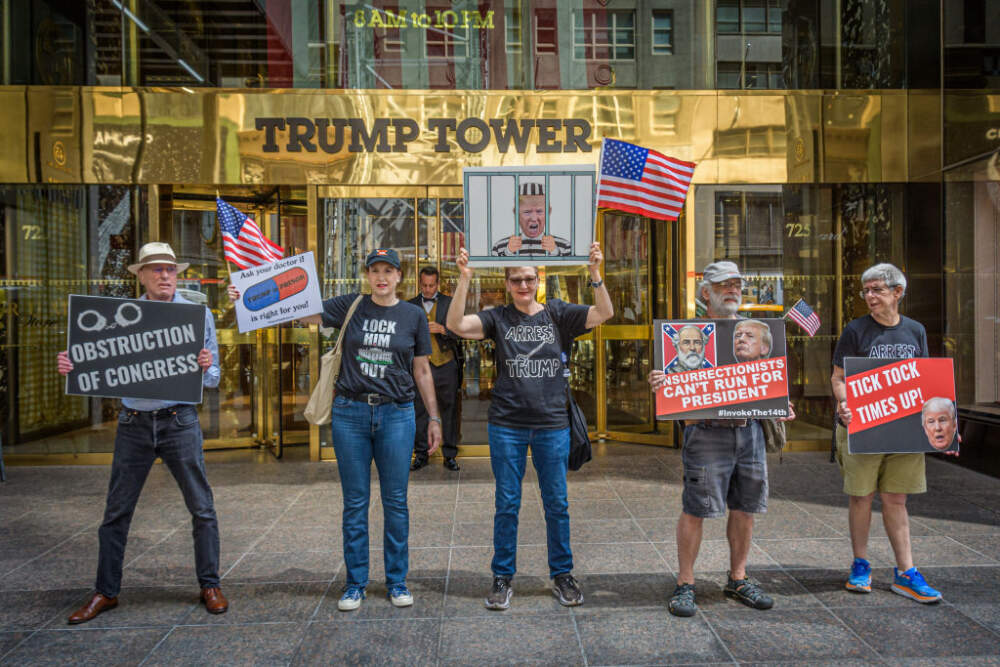What does it mean for country if former President Donald Trump is convicted of a crime and sentenced to prison time? That’s the question that’ll be on the minds of political pundits, historians and legal experts when Trump appears in a Washington, D.C. federal court today.
But what’s been almost entirely absent from the conversation is the possibility that Trump and Jack Smith, the special counsel, might just negotiate a plea deal that makes this question moot.
At some level, we understand why no one is talking about this scenario: Trump and Smith, along with their supporters and proxies, have argued that the matter before us goes to the very core of American democracy. And a negotiated resolution to such a consequential case — a resolution that would eliminate the spectacle of a full jury trial and verdict — may seem deeply unsatisfying.
But before you write off a plea deal as crazy, consider the following:
More than 90% of all federal criminal cases are resolved by plea agreement, not a trial. Indeed, without negotiated plea deals, the entire federal judicial system would be overwhelmed and come to a halt.
And while, yes, Trump portrays himself as a take-no-prisoners fighter, he also portrays himself as a great negotiator. And in truth, throughout his life, Trump’s preferred modus operandi has been to negotiate out-of-court settlement deals. Just look at the facts surrounding his current criminal indictment in New York City, which involves the negotiated hush money payment he made to a porn star during the 2020 presidential campaign.
When it’s in his interest, Trump is hardly averse to negotiating his way out of a mess.

We know that plea bargains can be a bit icky. The entire set-up involves a defendant, who may (or may not!) be guilty, deciding to plead guilty in open court (often to lesser charges) in exchange for a reduced set of penalties or prison time.
But the fact that such bargains can feel icky doesn’t make them wrong.
Just last week, the president’s son, Hunter Biden, entered a federal courtroom prepared to plead guilty to various crimes only to leave that same courtroom several hours later having plead not guilty to the same exact crimes because the plea agreement fell apart.
There’s much more to these agreements than principle and integrity. They are the way of the world; this is how our legal system works.
When it comes to this latest federal indictment of Trump, a plea agreement could advance many interests — and not just for the former president, Jack Smith, and the Department of Justice. The country and our democracy have something to gain, too.
Many say Trump jumped into the 2024 presidential race extremely early in the cycle for a single reason: to reduce the chances he would be criminally indicted, convicted and serve prison time. Indeed, his advisers have warned him that winning in 2024 could be his only chance of avoiding jail. What’s more, Trump’s legal fees are so high that he has already diverted $40 million of campaign contributions to pay them. And this is only the beginning, as the cases against him continue to pile up.
For Jack Smith, the Justice Department and others who view Trump as a singular threat to American democracy, there is the desire to pursue justice and preserve the rule of law.
Whatever other noble interests Trump’s foes may hope to advance, stopping a second Trump term is paramount among them.
But what do most Trump opponents and democracy lovers fear the most? The chance that Trump wins the Republican nomination and goes on to reclaim the White House in 2024. Once back in the Oval Office, there is little doubt he would accelerate the dismantling of the democratic institutions that (barely) stopped him from stealing the election in 2020. Whatever other noble interests Trump’s foes may hope to advance, stopping a second Trump term is paramount among them.
Given the prime motivating interests on both sides — for Trump, to avoid prison and stem untold financial losses; for the Justice Department, to buttress the rule of law and preserve our democracy — the possibility of a negotiated plea bargain may be the most viable, least costly, and wisest way forward.
What might such a deal look like?
Imagine an agreement where Trump pleads guilty to some set of lesser charges and, in exchange, gets a recommendation of no prison time — provided he agrees to end his campaign for president and never run for elected office again.
We admit that it is doubtful that Smith could legally negotiate a plea with Trump where the former president agreed not to run for a second term. Constitutionally speaking, the 14th Amendment could only bar Trump from seeking public office if he engaged in “insurrection” or “rebellion.” The current indictment does not make that charge.
Having said that, if Trump were convicted on Count Four — Conspiracy Against Rights — it’s nearly certain that there would be subsequent cases filed alleging that the conviction amounted to “insurrection” and “rebellion,” thus forbidding Trump from running for further office.
Moreover, even stalwart Trump supporters in Congress have indicated that a criminal conviction of the former president would end their support of his candidacy.
Simply put, a negotiated guilty plea that kept Trump out of prison would almost certainly put an end to his campaign for all practical purposes, even if that were not an explicit part of the deal.
In addition to meeting some of the core interests of both sides, there’s a strong argument that the national interest is advanced. The country avoids the prospect of an American president serving time in prison. As delicious as that outcome may sound to some, it’s inarguable that sending a former president to jail sends a negative signal to the world about the health of American democracy. And, of course, imprisoning Trump would further stoke the anger and a desire for vengeance and extremism that has only grown in the years since 2020. Why feed this beast and make matters worse?




With Trump functionally out of the 2024 election, the country could perhaps move on to address some of the real issues that pose an existential threat, from climate change, to immigration, education, and China. The collective sigh of relief from a deal that ended or mortally wounded a Trump 2024 campaign might be audible across the land.
To be clear, we have no illusions that a plea bargain is a perfect or magic solution. About half of Republicans support Trump; nearly 60% of his supporters are hard core and won’t be satisfied until he is completely vindicated. But the other 40% or so are “soft” and persuadable. Eliminating Trump from the presidential race would prevent further hardening in his favor and open a path for the movable 40% to seek another candidate without losing face for shifting their support.
And yes — for those who insist on the purity of principle, for those whose only desire is to see Trump convicted and behind bars — we get the discomfort of the plea deal. But compromise is as core a part of democracy as are principles.
Given the extremely high stakes, the inherent risks to democracy, the costs of a prolonged and painful trial during a presidential election season when there are serious issues facing the nation, a negotiated plea bargain should at least be part of the conversation. It might even be the best way forward.
Robert C. Bordone is a senior fellow at Harvard Law School, the founder of the Cambridge Negotiation Institute and an expert in negotiation, mediation, and conflict resolution. He spent more than two decades on the Harvard Law School faculty.
Kevin Keystone is a consultant at the Cambridge Negotiation Institute, a former training director of the Harvard Mediation Program, and a recent graduate of Harvard Divinity School.
This post was originally published on this site be sure to check out more of their content.






